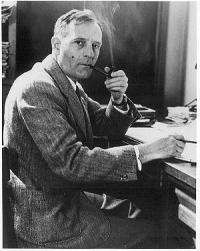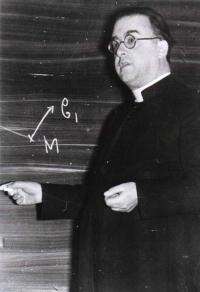July 13, 2011 report
Web abuzz with claims that Hubble sought to censor Lemaitre's paper

(PhysOrg.com) -- In one of those odd scientific debates where people who ought to know better, speak up, and in this case, print articles on arXiv, making claims about personal issues rather than science, buzz has been created that might lead to little more than rhetoric. In this case, it’s first Sidney van den Bergh, a Canadian astronomer, who has published a paper on arXiv citing evidence that Belgian astronomer Georges Lemaitre's paper on cosmological observations appeared to have been intentionally censored when translated into English, and then David Block, a South African mathematician and amateur historian adding fuel to the fire by publishing to the same site an article where he asserts he has proof that American, Edwin Hubble (of whom the Hubble telescope is named) was involved in a conspiracy of sorts, to censor the paper previously mentioned by van den Bergh.
The entire argument centers on a paper first published by Lemaitre in 1927 in Belgium; written in French it wasn’t read much outside of his home country. In the paper, Lemaitre outlined his theory that the universe appeared to be expanding, and also offered a constant that could be used to determine the rate.
In 1929, Hubble published a paper that offered the same theory and constant (which came to be known as the Hubble constant) and was at the time given full credit for the discovery. Later however (1931), Lemaitre’s paper was translated into English and published in the Monthly Notices of the Royal Astronomical Society (MNRAS), which of course gave some credence to Lemaitre’s work, but not entirely, because it was subsequently discovered that certain sections of the original paper had been omitted, the most important of which, was the part where Lemaitre derived the constant for which Hubble was ultimately credited.

Block offers as proof, a letter written by Scottish astronomer William Marshall Smart (editor for MNRAS), that he says, shows that it was Lemaitre himself who performed the translation, but because Smart only asked for certain sections to be translated, the end result wound up an abbreviated version of the original. Block then goes on to say he believes it was pressure on Smart, from Hubble, that caused him to do what he did, though he offers little evidence to support such a claim.
At this point, professional historians are not convinced, and so, this argument, as with many others of its kind in the science field, will likely rage on, with little gained, but perhaps something lost, as energy that could be spent on science, is wasted on meaningless squabble.
More information: A Hubble Eclipse: Lemaitre and Censorship, David L. Block, arXiv:1106.3928v2 [physics.hist-ph] arxiv.org/abs/1106.3928v2
Abstract
One of the greatest discoveries of modern times is that of the expanding Universe, almost invariably attributed to Hubble (1929). What is not widely known is that the original treatise by Lemaitre (1927) contained a rich fusion of both theory and of observation. The French paper was meticulously censored when printed in English - all discussions of radial velocities and distances (and the very first empirical determination of "H") were omitted. Fascinating insights are gleaned from a letter recently found in the Lema^itre archives. An appeal is made for a Lemaitre Telescope, to honour the discoverer of the expanding universe.
via Nature
© 2010 PhysOrg.com

















